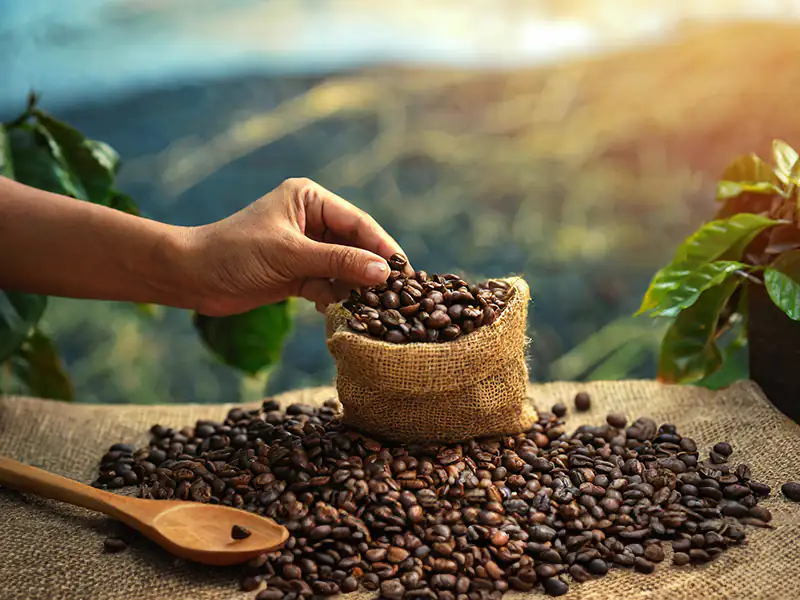Coffee Market Summary
The global coffee industry stands at the precipice of an unprecedented transformation in Q2/2025, with market valuations reaching $778.37 billion amid a perfect storm of climate volatility, technological revolution, and supply chain disruption. This comprehensive analysis reveals how artificial intelligence, precision agriculture, and biotechnology advances are fundamentally reshaping coffee cultivation, while climate change threatens traditional production zones across the globe.
Curious how CRISPR coffee trees and cloud analytics will rewrite Q3–Q4 prices? Read on.
3. Innovations & Long and Short-Term Trends in Coffee
3.1. Technology Transformation in Coffee
Technology Adoption Rates in Coffee Production 2025 (%)
- CRISPR Robusta clone 14 validated—77% edit success, 50% homozygous mutations; targets drought & nematode resistance..
- RNN-IoT soil engines deliver 85% yield forecast accuracy, guiding fertigation & saving 25% inputs.
- Internet of Things (IoT) deployment has reached 58% penetration in coffee production, providing real-time monitoring of soil moisture, temperature, humidity, and plant health indicators. These networks achieve 95% water efficiency improvements through precision irrigation while enabling 25% reduction in post-harvest losses.
- AI-powered systems have demonstrated 90% accuracy in quality assessment, disease prediction, and harvest optimization. Machine learning algorithms predict yield fluctuations with 85% accuracy up to 6 months in advance, enabling bulk suppliers and agriculture exporters to optimize inventory management and contract strategies.
- Digital Platform Integration accessing global B2B marketplace opportunities and automated trading systems.
Within the fast-evolving landscape of global agriculture trade, Freshdi.com has become a trusted B2B platform connecting verified suppliers and buyers in the agriculture sector. With nearly 1,900 global buyers and 2,900 global suppliers actively sourcing in the coffee and coffee bean category (over 2M buyers and 3M suppliers in all categories) and trading across more than 200 countries, the platform offers a reliable and cost-saving environment for Global Agri commerce — powered by smart AI technology. Every month, Freshdi.com records more than 450 buyer requestations and currently has 100+ hot suppliers.
Freshdi.com enables businesses to access a wide variety of verified coffee and coffee bean categories — from raw coffee (unwashed), ground coffee, coffee powder and roasted coffee bean to specialty products like Arabica, Robusta, and Green Coffee. What sets Freshdi apart is its ability to facilitate real-time connections, supported by an AI-powered sourcing engine that matches qualified inquiries with trusted suppliers efficiently.
3.2. Environment & ESG in Coffee
The coffee industry has embraced sustainability as a core business imperative, with 78% of companies implementing comprehensive carbon footprint reduction programs. Agriculture companies and food manufacturers are achieving 25% reduction in greenhouse gas emissions per kilogram produced while maintaining quality and yield standards.
Sustainability Metrics in the Coffee Industry: Adoption and Emission Reductions (2025)
Regenerative agriculture practices demonstrate 45% adoption among producers, delivering multiple benefits:
- Soil health improvement through organic matter enhancement and carbon sequestration
- Water conservation achieving 95% efficiency in precision irrigation systems
- Biodiversity enhancement with 40% increase in species diversity on sustainable farms
- Carbon neutral operations positioning 35% of processing facilities with renewable energy
Waste reduction programs achieve a 30% decrease in post-harvest losses through improved handling, processing optimization, and by-product valorization. Food wholesale companies are developing integrated approaches to resource utilization, creating additional revenue streams worth $1.2 billion annually from previously discarded materials.
Innovation areas creating value for bulk suppliers and agricultural exporters:
- Biogas production achieving 60% energy self-sufficiency from waste conversion
- Compost optimization delivering 40% soil health improvement through organic matter enhancement
- Packaging innovation implementing algae-based films in pilot programs
- Upcycling programs monetizing 15% of waste streams through alternative applications
Key Innovation Areas Creating Value for Bulk Suppliers and Agricultural Exporters (2025)
3.3. Strategic Recommendations in Coffee
- Technology Integration Imperatives – Automation systems (71% adoption) and AI/ML applications (65% implementation) deliver 30% yield improvements and 25% cost reductions while enabling premium market access through enhanced quality consistency and operational transparency..
- Digital Commerce Integration – Agricultural exporters and wholesale distributors embrace B2B marketplace platforms like Freshdi.com to access global buyer networks spanning 150+ countries while achieving 60% reductions in sourcing time and transaction costs.
- Supply diversification – pivot 15% sourcing to Ethiopia & Uganda; leverage new drought-tolerant genetics to cap climate risk.
- Green finance – tap sustainability-linked loans (200 bp discount) by achieving carbon-neutral roast facilities.
- Marketing edge – certify agroforestry lots; bundle with QR provenance for direct-to-consumer storytelling.
Extreme close-up of roasted coffee beans showing detailed surface texture and natural imperfections
4. Conclusion – Why 2025 Could Be Coffee’s “Moonshot” Year
The global coffee and coffee bean market in Q2/2025, valued at $778.37 billion, is undergoing rapid transformation fueled by climate adaptation, technological innovation, and shifting consumer demand. Companies that lead in automation, AI, and IoT integration are achieving up to 30% yield gains and 25% cost savings, while digital B2B platforms open access to global buyers and cut sourcing time by 60%.
Success now depends on:
- Tech adoption to boost efficiency and quality
- Climate resilience in high-risk regions like Ethiopia and Brazil
- Sustainability as a baseline—not a differentiator
- Strategic positioning in fast-growing regions (Asia-Pacific, Latin America)
- Marketplace connectivity to reach verified buyers globally
The future will belong to agriculture exporters, wholesale suppliers, and food manufacturers who combine biotech, precision farming, and digital trade to stay competitive. Those embracing innovation and sustainability will lead the next era of global agricultural trade.
Reference:
teaandcoffee, mexc, precedenceresearch, researchandmarket, statista, comunicaffe.
Freshdi.com is the world’s leading global B2B marketplace for agricultural products and food, connecting directly between global buyers and suppliers. Freshdi.com has over 3M+ suppliers, 2M+ active buyers, and 1,000+ buying requests updated daily in agri-food.
About us
Try it for yourself.
Join a global network of verified agri-food buyers and suppliers.



